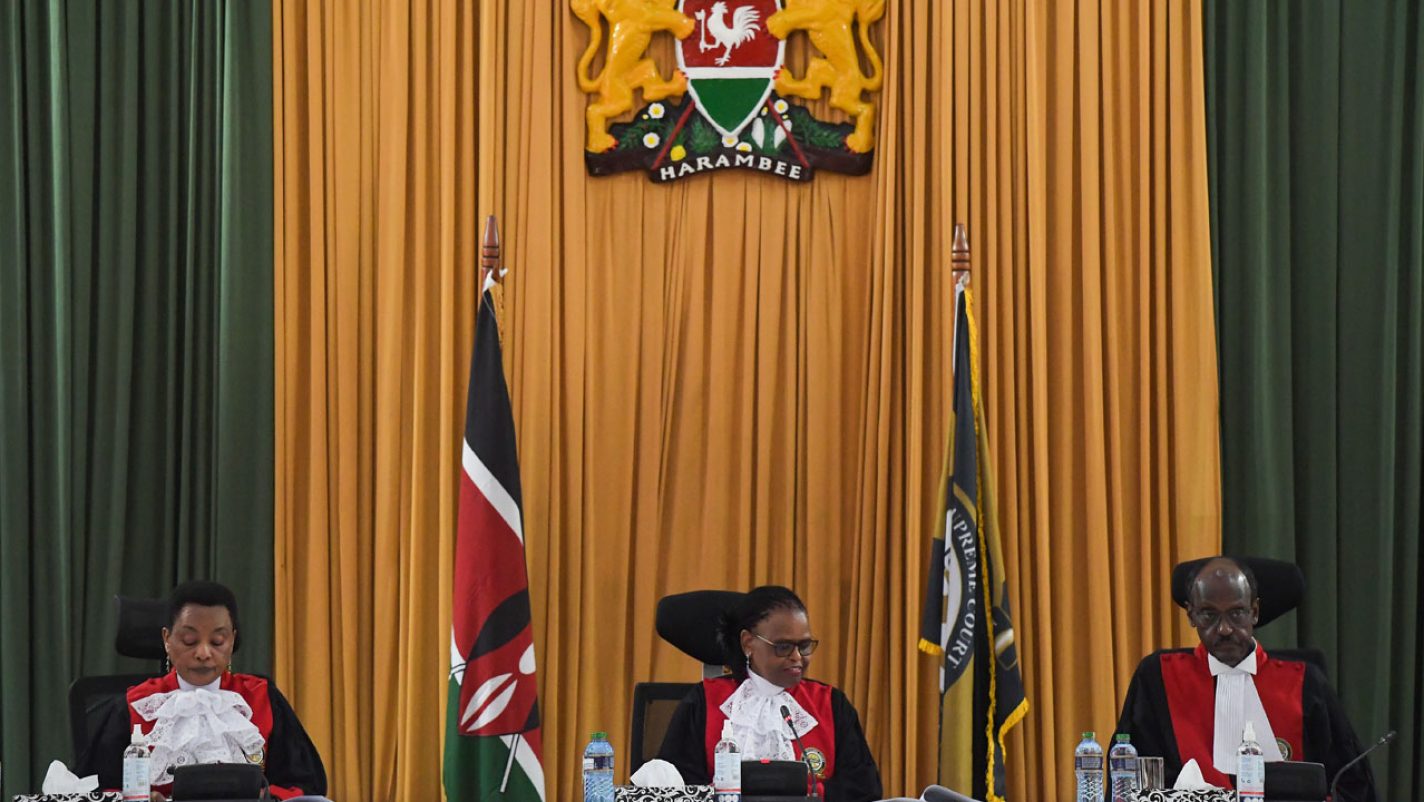By AFP
Kenyans anxiously awaited a Supreme Court ruling Monday on petitions challenging the outcome of the August presidential election, with weeks of political uncertainty looming if the poll is annulled.
Deputy President William Ruto was declared the winner of the tightly fought race, scraping to victory by a narrow margin of less than two percentage points against Raila Odinga, a veteran opposition politician now backed by the ruling party.
Odinga filed a petition to Kenya’s top court last month, alleging fraud in the vote tallying process and claiming he had “enough evidence” to show he had in fact won the August 9 election, which ranks as one of Africa’s most expensive polls.
“Judgment day,” was the front-page headline in The Standard, while People Daily declared: “Moment of Truth”.
Although voting day passed off peacefully, the results sparked angry protests in some Odinga strongholds and there are fears a drawn-out dispute may deepen widespread economic malaise and lead to violence in a country with a history of post-poll unrest.
“We have already wasted a lot of time and money so if we go back to election we will waste (even more) time and resources,” said Anne Karanja, a fruit seller in the capital Nairobi.
“I voted but I feel like I can’t vote again,” she told AFP, echoing the frustration felt by many Kenyans.
The court will examine whether any irregularities were substantial enough to nullify the election, as was the case with the August 2017 presidential poll, which Odinga also challenged.
Judges have spent the last two weeks rifling through boxes of evidence to figure out if the technology used by the election commission met the “standards of integrity, verifiability, security and transparency”.
Both the Ruto and Odinga camps have pledged to respect the court’s decision, which is due to be delivered at 12:00 pm (0900 GMT).
Cost of living crisis After 2017’s annulment, the Independent and Electoral Boundaries Commission was under heavy pressure to deliver a clean poll.
But this year’s outcome sparked a rift within the IEBC itself, with four of its seven commissioners accusing chairman Wafula Chebukati of running an “opaque” process.
Odinga’s 72-page petition alleges that hackers broke into IEBC servers and uploaded doctored result forms. His lawyers also claim that Chebukati failed to tally around 140,000 votes.
Chebukati has denied the claims, insisting he carried out his duties according to the law of the land despite facing “intimidation and harassment”.
After assessing the transparency of the poll, the court will finally rule on whether Ruto met the constitutional threshold of 50 percent plus one of the valid votes cast.
If judges order an annulment, a fresh vote must be held within 60 days, but the run-up to a new election is likely to be fractious.
Odinga has insisted that any fresh poll must be supervised by a new chairman. The 77-year-old boycotted 2017’s court-ordered re-run, accusing the IEBC of lacking credibility.
Since 2002, no presidential poll outcome in Kenya has gone uncontested, with many fearing that a prolonged electoral process and the resulting uncertainty will only worsen the country’s cost of living crisis.
Voter disenchantment Moses Mungai said his flower business — already hit hard by the Covid pandemic — had taken yet another knock, with Nairobi’s streets deserted for several days following the election.
“People did not come out of their houses,” the 55-year-old told AFP, adding that he expected similar scenes to unfold after Monday’s ruling.
“People fear there will be skirmishes. They will close (shops) and then wait for things to be OK.”
At around 65 percent, turnout was sharply lower than in the August 2017 election, with observers saying it reflected growing disillusionment among citizens.
Odinga, who previously said he was cheated of victory in the 2007, 2013 and 2017 polls, has framed the legal battle as a fight “for democracy and good governance”.
Ruto in turn has urged the court to throw out the petition, accusing Odinga of trying “to have another bite at the cherry through a judicially-forced re-run”.
The 2017 poll saw dozens of protesters killed at the hands of police. Kenya’s worst electoral violence occurred after the 2007 vote, when more than 1,100 people died in politically motivated clashes involving rival tribes.
If the court upholds the results, Ruto will become Kenya’s fifth president since independence from Britain in 1963, taking the reins of a country battling inflation, high unemployment and a crippling drought.

